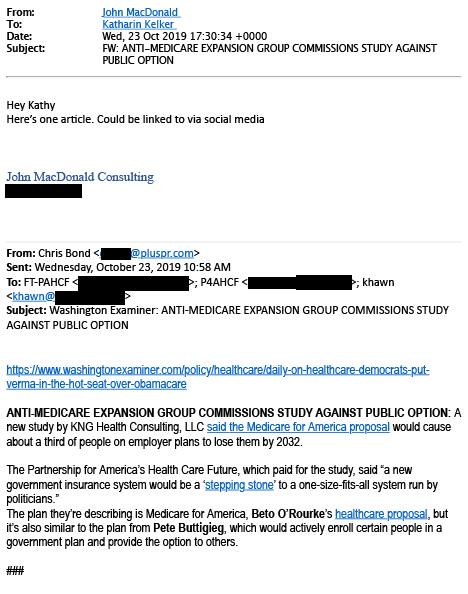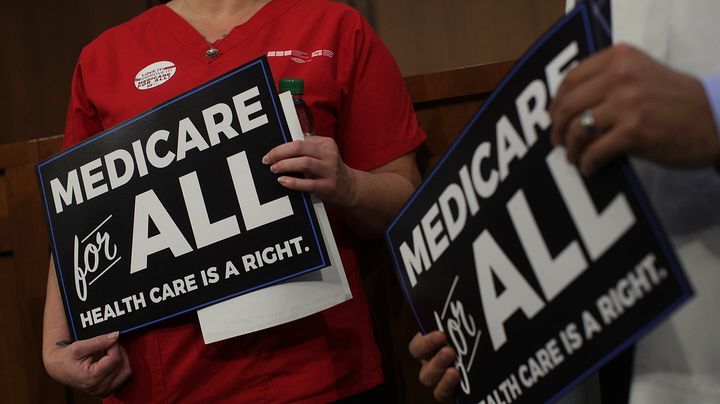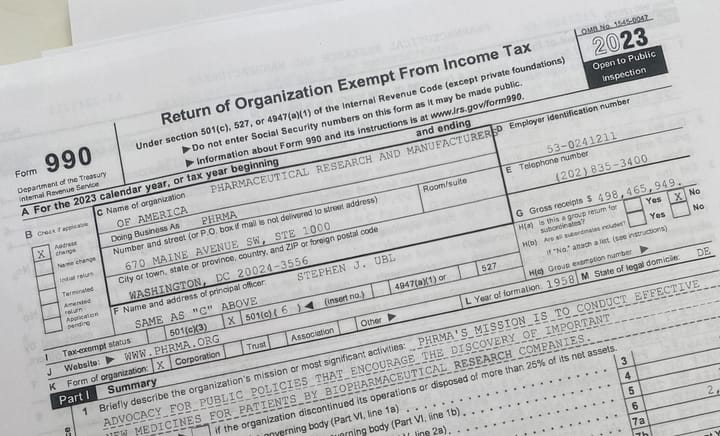The American Prospect is a nonprofit, independent magazine covering public policy and politics. Sludge is re-publishing this article.
A Democratic communications consultant is collaborating with the anti–health care reform group Partnership for America’s Health Care Future (PAHCF), according to a document sent to the Prospect. Despite most of the Democratic caucus and its presidential candidates arguing for some reform, whether that’s a public option or Medicare for All, Kristen Hawn seems to be working with a group actively campaigning against any of it.
Hawn is a partner at the public-affairs and communications firm Granite Integrated Strategies. Her firm works with the conservative Democratic Blue Dog Coalition, whose political action committee paid Granite $3,000 every month the first half of this year for “communications consulting,” according to its FEC midyear filing for 2019. Hawn was previously the Blue Dogs’ communications director.
Hawn and her firm are a common link between Democratic lawmakers and PAHCF, whose members are lobbyists for hospitals, insurance companies, and pharmaceutical manufacturers.
“When you find a common vendor dealing with strategy, who’s working with both a corporate advocacy group and candidates or a political party, it’s something that needs to be examined,” says Larry Noble, former legal counsel at the Federal Election Commission, in an interview with the Prospect. “The question is what influence are they having. And what does that tell you about the position of the candidates of the party.”
According to a document obtained from a Freedom of Information Act request by the group Medicare for All Now, Hawn was directly sent an email with the link for a Washington Examiner story about PAHCF’s study against then-candidate Beto O’Rourke’s Medicare for America proposal. PAHCF press official Chris Bond copied text from the article into the email, which said that O’Rourke’s plan was similar to Pete Buttigieg’s Medicare for All Who Want It plan. The study called these moderate health care reforms a “stepping stone to a one-size-fits-all system run by politicians.” Forbes Tate Partners, a D.C.-based lobbying firm, and PAHCF’s public-relations email address were also recipients of this email.

That email was then also forwarded to Montana state Representative Katharin Kelker, a Democrat who wrote an op-ed against single-payer health care edited by a lobbyist connected to PAHCF. The message suggested that Kelker could share the Washington Examiner link on social media.
The email shows that Hawn is at the minimum collaborating with PAHCF to change public opinion on health care reform, in favor of leaving the Affordable Care Act in its current form. Meanwhile, the Democratic primary candidates—as well as much of the national debate on health care—ranges between expanding the ACA with a public option, supported by more-moderate candidates Buttigieg and former Vice President Joe Biden, or Medicare for All, proposed by Senators Bernie Sanders and Elizabeth Warren. PAHCF and its allies oppose any reform whatsoever.
Hawn’s firm did not respond to a request for comment, and the Prospect was unable to reach her at the firm’s downtown D.C. address.
“I do find it [the connection between Hawn and PAHCF] concerning and I think it’s a transparency issue,” Noble says. “It’s important for people to understand where the backing is coming from for these various positions.”
The Prospect previously reported about PAHCF’s financial connections to other Democratic consultancies and the most influential health care lobbying groups. In addition, The Washington Post reported that PAHCF worked with state lawmakers to edit op-ed submissions about health care, so that they were more damning about any possible reforms.
Noble adds that in the health care debate specifically, there is a lot of misinformation and self-interest involved. So any attempt to sway public opinion should be transparent about where those ideas come from.
“If you’re consulting for the Partnership [PAHCF] and also consulting for candidates on this same issue, the odds are there’s going to be an alignment on messages on this issue. And again, the public should know that,” Noble says.
No members of the Blue Dog Coalition are running for the Democratic nomination, but some have changed their health care positions since getting elected.
Among Blue Dog Coalition chairs, there are clear examples of health care position reversals. Representative Anthony Brindisi voted for the New York state single-payer health care program in the State Assembly in 2017. But now that he’s in Congress, Brindisi told The Washington Post that he thought single-payer was a “losing message” in 2020. Additionally, Representative J. Luis Correa co-sponsored H.R. 676, the Expanded & Improved Medicare for All Act, in 2017. But today, there is nothing on his website’s health care section about Medicare for All, and he did not co-sponsor Representative Pramila Jayapal’s Medicare for All Act of 2019, H.R. 1384. That bill got a hearing this week in the House Energy and Commerce Committee, one of the leading committees of jurisdiction on health care policy.
“The reality is that a lot of Democratic candidates are getting financial support, legal political contributions, from people who are aligned with the health care industry,” Noble says. “Is the Partnership for America’s Health Care Future being supported or are the consultants being supported because they are trying to keep these candidates in line or are they being supported because the candidates independently reached these views? It raises a serious question.”
Related:



